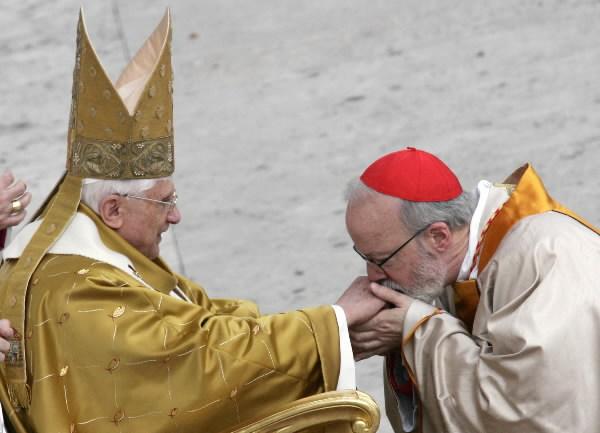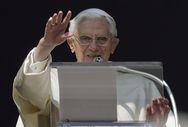Some Say Former Palm Beach Bishop's Chances to Be Next Pope on the Rise
By Lona O'Connor
In the constant stream of speculation on who will be the next pope, it was inevitable: Cardinal Sean O’Malley’s name is now being mentioned as a credible candidate to succeed Pope Benedict XVI, who will step down on Feb. 28 for health reasons. O’Malley was bishop of the Diocese of Palm Beach for eight months in 2002. The 125-member College of Cardinals is expected to meet no later than March 15 to name a successor in an election that is by tradition shrouded in secrecy. John Allen, a commentator for the National Catholic Register, started the speculation in his Tuesday post: “Another name has generated a surprising degree of buzz in the Italian press: Cardinal Sean O’Malley of Boston, partly on the strength of his profile as a reformer on the church’s sexual abuse scandals, and partly because of his Capuchin simplicity as a perceived antidote to the Vatican’s reputation for intrigue and power games.” On Tuesday the betting site Paddy Power gave 33 to 1 odds against O’Malley. That made O’Malley’s chances better than those of New York’s Cardinal Timothy Dolan at 66 to 1, but not as good as the two front-runners, Archbishop Angelo Scola of Rome at 2 to 1 and Cardinal Peter Turkson of Ghana at 5 to 2 odds. Paddy Power betters correctly identified German Cardinal Joseph Ratzinger as the successor of Pope John Paul II in 2005. Sure enough, Ratzinger became Pope Benedict XVI. O’Malley rapidly built a reputation as the new broom that sweeps clean. In 2002 he was named the bishop of the Diocese of Palm Beach, following two bishops — J. Keith Symons and Anthony O’Connell — forced out of their posts by allegations of sex with boys and young men. After eight months here, he replaced Cardinal Bernard Law as Archbishop of Boston, the epicenter of the American priest sexual scandal. Three years later, Benedict XVI made O’Malley a cardinal. Cardinal O’Malley was keeping mum on his 15 minutes of papal fame on Tuesday. But in a Boston news conference on Feb. 12, the day Pope Benedict stunned a billion Catholics by resigning, he answered a question about his chances: “I haven’t lost any sleep about it and I have bought a round-trip ticket,” he told reporters. “I am counting on coming home. I don’t think it’s anything I would aspire to. It’s a challenging position, a lonely position. In people’s imagination, (cardinals) are all working to get their candidate elected. But I think every (cardinal) goes in fearful that eyes may fall on him. It’s a very grave responsibility.” Then he showed what a good pope he might be by answering a reporter’s question in Spanish with his own capable Spanish. He also speaks Portuguese and Creole, which thrilled his fans during his brief tenure in South Florida. Almost 40 percent of American Catholics are of Hispanic descent. His facility with languages suggests that O’Malley has the ability, like Pope John Paul II, to address Catholics in their own languages. If the 125 cardinals are in a mood for reform in the worldwide priest sexual scandal, O’Malley has the skills to make that happen. As bishop of the Fall River, Mass., diocese before he arrived in the Palm Beach Diocese, “he helped create a state-of-the-art policy on sexual abuse for the Fall River Diocese. It was a model program, and it remains a model program,” said Boston victims’ attorney Roderick MacLeish, Jr., at a 2003 speech at the Forum Club of the Palm Beaches. In August, 2011, O’Malley released an online list of priests in the Archdiocese of Boston accused of sex abuse for the past 60 years. But he was criticized by a victims’ advocacy group for waiting too long. “Having met with hundreds of survivors, I know firsthand the scars you carry. And I carry with me every day the pain of the Church’s failures,” Cardinal O’Malley said in 2011. His agonizing over the task of healing the Boston Archdiocese, so torn by the sex scandal since it broke in 2002, might keep him from being steely enough to do the same if he became pope, said Allen. O’Malley’s “Capuchin simplicity” charmed Catholics in the Palm Beach Diocese when he arrived. His simple brown wool robe, tied with a knotted white rope, presented a refreshing contrast to the richly embroidered scarlet garments usually worn by bishops and cardinals. He prefers to be addressed as “Cardinal Sean.” But being a soft-spoken Capuchin Franciscan could work against him for two reasons, said Paul Gaucher, a deacon in the Palm Beach Diocese until he moved to Mount Dora, where he works with a Franciscan order. First, said Gaucher, there are far more diocesan priests who rise through the ranks to become cardinals than priests belonging to a particular order, such as the Capuchin Franciscans. There have been a few Franciscan popes, but they were vastly outnumbered by popes who were originally diocesan priests. There has never been a Capuchin Franciscan pope. Second, it is possible to be too humble to be an effective pope, Gaucher said. Humility is considered a key virtue in the Capuchin Franciscan religious order. Founded by the 12th Century ascetic St. Francis of Assisi, the simplicity and poverty of Franciscans stood in stark contrast to the conspicuous wealth and pomp of the Catholic Church at that time. “He is a wonderful holy man, and I’m sure he would excel,” said Gaucher. “But as wonderful as Cardinal O’Malley is, dynamic is not a word you would use in a sentence about him. Pope John Paul II was captivating. You need a dynamic pope.” So as appealing as the idea of a pope in rough wool robes and sandals might be, reality will probably rule the cardinals’ vote next month. Allen, after listing O’Malley’s virtues, began to back off the notion. O’Malley’s pluses were his “global vision” and his language skills, including “at least a basic command of Italian.” But, Allen added, “O’Malley has zero experience in the Vatican. … Some cardinals will wonder if he’d be out of his depth trying to get the place under control.” Ed Ricci, a Jupiter attorney, was a student at Catholic University at the same time as O’Malley. When the two met again in 2002, they realized they had been students in the same theology class. “If any American has a chance, it’s him,” said Ricci, an outspoken critic of sexual abuse in the Palm Beach Diocese. “He has an absolutely impeccable reputation for integrity. He would tolerate none of that (sexual abuse) nonsense. That is a great act of courage. He is eons ahead of the institutional church.” Ricci’s meeting with O’Malley in 2002 turns out to be an odd parallel to O’Malley’s current prominence in the rumor mill. “I told him, ‘There’s a rumor that you might get appointed Archbishop of Boston.’ He said, ‘Ed, you have a better chance of winning the lottery.’ Well, he got the appointment.”
|
.
Any original material on these pages is copyright © BishopAccountability.org 2004. Reproduce freely with attribution.

